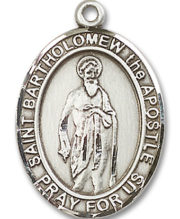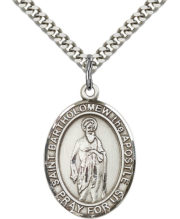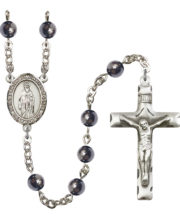Saints
St. Bartholomew the Apostle
St. Bartholomew Biography
 St. Bartholomew the Apostle, also known as Nathanael, is one of the twelve apostles of Jesus, according to the Bible. He is considered a martyr and is remembered in the Christian Church on August 24th. While his story is not detailed in the New Testament, the figure of Nathanael is mentioned in the Gospel of John as one of the first followers of Jesus.
St. Bartholomew the Apostle, also known as Nathanael, is one of the twelve apostles of Jesus, according to the Bible. He is considered a martyr and is remembered in the Christian Church on August 24th. While his story is not detailed in the New Testament, the figure of Nathanael is mentioned in the Gospel of John as one of the first followers of Jesus.
According to the Bible, Nathanael was originally from the village of Cana in Galilee. He was introduced to Jesus by his friend Philip, who had become a follower of Jesus and brought Nathanael to meet him. When Nathanael saw Jesus, he asked: “Can anything good come out of Nazareth?” But Jesus replied, “I saw you under the fig tree before Philip called you.” which Nathanael took as a sign of Jesus divine knowledge, and then declared Jesus to be the “Son of God” and the “King of Israel”.
In the New Testament, Nathanael is also referred to as Bartholomew, which is believed to have been his surname. He is listed among the twelve apostles in the synoptic gospels (Matthew, Mark, Luke) as well as in the list of apostles in the book of Acts. It is not mentioned anything more of Nathanael/Bartholomew in the New Testament
Tradition has it that after the Ascension of Jesus, Bartholomew traveled to India and preached there. One of the apocryphal works “Acts of Bartholomew” describe how he evangelized in India, and was martyred for his faith, killed by being flayed alive. Other traditions hold that he preached in Egypt, Mesopotamia, Armenia, Persia and Ethiopia.
St. Bartholomew is one of the twelve apostles who is commemorated in the liturgical calendar of the Western Church. He is also commemorated in the Eastern Orthodox Church, with his feast day falling on August 25th. He is one of the apostles, who is honored in the Roman Catholic Church, Eastern Orthodox Church, the Anglican Communion and the Lutheran Church
According to art tradition, Bartholomew is depicted as a young man holding a knife, the instrument of his martyrdom. The instrument is also referenced in the Latin name for his feast day, ‘Nativitas Bartholomaei Apostoli cum gladiis suis’ meaning “The birth of Bartholomew the Apostle with his knives”.
Bartholomew’s relics were believed to be in the cathedral of Lipari, an island north of Sicily, from the 8th century. It was destroyed in the eruption of the volcano in the Lipari island in the 17th century. After that it is said that his relics were translated to the church of San Bartolomeo in Benevento, Italy, but no longer exist today.
The apostle Bartholomew is remembered for his missionary work, spreading the teachings of Jesus, and for his willingness to die for his faith. He is remembered as a powerful figure of faith and perseverance, and continues to be honored in the Christian Church to this day.
The Life of St. Bartholomew
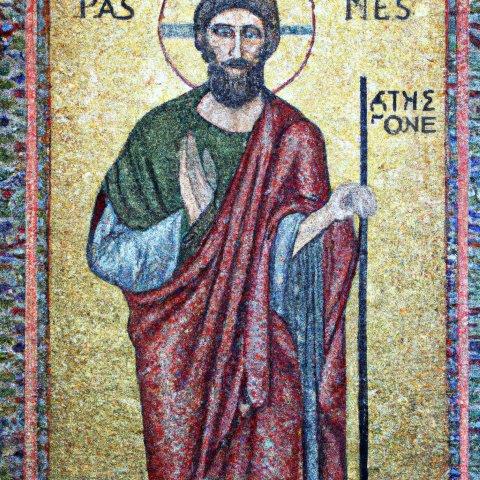 Saint Bartholomew was one of the twelve Apostles chosen by the Savior of the world. St. Bartholomew is mentioned in all three of synoptic gospels, but little information is given about the life and journey of Saint Bartholomew. Many scholars have considered him to be the same person as Nathanael, the “Israelite without guile”, mentioned in St. John’s Gospel (1:29-51). Born in Cana of Galilee, he was a doctor in the Jewish law, and became a faithful disciple of Jesus; he was one of the witnesses of His miracles and of His glorious Resurrection. He is also mentioned among the other disciples who were gathered together in the Upper Room after the Ascension of Christ praying, and who received the Holy Ghost with the rest.
Saint Bartholomew was one of the twelve Apostles chosen by the Savior of the world. St. Bartholomew is mentioned in all three of synoptic gospels, but little information is given about the life and journey of Saint Bartholomew. Many scholars have considered him to be the same person as Nathanael, the “Israelite without guile”, mentioned in St. John’s Gospel (1:29-51). Born in Cana of Galilee, he was a doctor in the Jewish law, and became a faithful disciple of Jesus; he was one of the witnesses of His miracles and of His glorious Resurrection. He is also mentioned among the other disciples who were gathered together in the Upper Room after the Ascension of Christ praying, and who received the Holy Ghost with the rest.
Tradition tells us that after the Ascension he preached the Gospel in Northwest India and in Asia Minor, and that he suffered martyrdom in Greater Armenia. In this latter place he converted to the Christian Faith the King, Polymius, and his Queen, and likewise twelve cities. This excited great hatred against him on the part of the priests of that nation. They constantly inflamed Astyages, brother of Polymius the King, against the Apostle, to such a degree that he commanded Bartholomew to be flayed alive in a most cruel manner, and to be beheaded; in which martyrdom he gave up his soul to God.
Prayer to St. Bartholomew
Prayer of Intercession to St. Bartholomew
God and loving father, you have given us the glorious Apostle Bartholomew as our beloved Patron Saint and powerful advocate in heaven.
We offer you our prayers, animated by a spirit of confidence that through the efficacious intercession of Saint Bartholomew, we shall merit your unfailing help and protection and shall ever remain loyal and devoted to Divine will all the days of our life.
Teach us to cherish, proclaim, and practice the Gospel message of Christ, which Saint Bartholomew so eloquently preached and finally sealed with his heroic martyrdom.
As we prepare devoutly for his solemn feast by this novena of prayers, we trustingly raise our minds and hearts to you.
Refuse not, o Lord God, our humble petition but unite it with that of Apostle Bartholomew and of the Blessed Virgin Mary, Queen of the Apostles, so that we may obtain the grace of true repentance for our Sins, of divine assistance in our spiritual and temporal wants, and of constant fidelity to all our Christian duties. This we ask through Jesus Christ, Our Lord,
Amen.
Prayer to follow Jesus like St. Bartholomew
O Jesus, Saint Bartholomew’s greatest desire was to know the truth. When first informed about You, his initial reaction was, “How can anything good come from Nazareth?” But as soon as he met You, he wanted to become one of Your disciples. You said of him, “Here is a man in whom there is no deception.” I ask him to pray against the deceptions that are influencing me and the people I know. Help us to experience Your affirmation when we are honest, give us courage to resist lying as a means of self-protection, and inspire our minds to recognize the truth when we hear it. Saint Bartholomew, pray for us. Amen.
Prayer to St. Bartholomew for Conversion
Dear St. Bartholomew, you were a faithful disciple of Jesus and brought the gospel to many people. I ask for your intercession as I seek to bring the love of Christ to those around me. Help me to be a witness to the truth, and to share the good news with others. May I always be open to the guidance of the Holy Spirit and may I be a shining example of faith and love. Amen.
Prayer to Saint Bartholomew for Healing
Dear St. Bartholomew, you were a healer and a comfort to those in need. I ask for your intercession as I seek physical, emotional, and spiritual healing. May I be restored to health and strength, and may I be a source of comfort and hope to others. Help me to trust in the Lord’s loving care, and to have faith in His power to heal. Amen.
Prayer to St. Bartholomew for Protection
Dear St. Bartholomew, you faced many challenges and dangers in your ministry, but you remained steadfast in your faith. I ask for your intercession as I face the challenges and difficulties of life. Protect me from harm, and give me the courage and strength to persevere in the face of adversity. Help me to always put my trust in God, and to be a faithful witness to His love. Amen.
St. Bartholomew the Apostle: The Patron Saint of Tanners and Architects
St. Bartholomew the Apostle is one of the twelve apostles of Jesus Christ, and is recognized as a patron saint of tanners and architects. This article will explore the life of St. Bartholomew and his significance as the patron saint of tanners and architects.
St. Bartholomew was one of the twelve apostles of Jesus Christ, and is believed to have been a native of Cana in Galilee. He is mentioned in the New Testament as a witness to the miracles of Jesus and as one of the apostles who preached the gospel throughout the world.
St. Bartholomew is remembered for his zeal for spreading the gospel and for his efforts to bring people to a closer relationship with God. He is also remembered for his willingness to suffer for his faith, and for his unwavering commitment to his mission.
Patron Saint of Tanners and Architects
St. Bartholomew is recognized as the patron saint of tanners and architects. The association between St. Bartholomew and tanners dates back to the Middle Ages, when tanners were often looked down upon due to the unpleasant odors associated with their trade. St. Bartholomew was seen as a symbol of hope and comfort to these tanners, who were often marginalized by society.
The connection between St. Bartholomew and architects is not as clear, but it is believed that it may be due to the story of St. Bartholomew building a church in Ethiopia. This association between St. Bartholomew and architects symbolizes the importance of creating sacred spaces for worship and for building up the Kingdom of God.
St. Bartholomew the Apostle is remembered for his unwavering faith and commitment to spreading the gospel. He is recognized as the patron saint of tanners and architects, and his legacy continues to inspire people today. May we be inspired by the life of St. Bartholomew and may we strive to live a life of faith, love, and devotion to God.
Reflection on the feast day of St. Bartholomew the Apostle
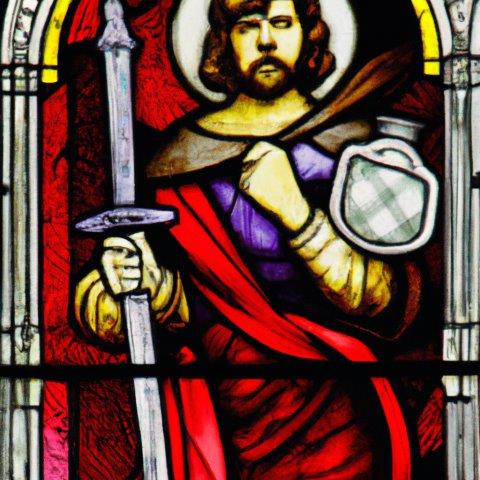 The feast day of St. Bartholomew the Apostle is celebrated on August 24th in the Roman Catholic Church, and on June 11th in the Eastern Orthodox Church.
The feast day of St. Bartholomew the Apostle is celebrated on August 24th in the Roman Catholic Church, and on June 11th in the Eastern Orthodox Church.
As we celebrate the feast of St. Bartholomew, we are reminded of the call to be faithful and courageous witnesses of Christ in the world. St. Bartholomew, also known as Nathanael, is described in the Gospel of John as a man without deceit. He recognized Jesus as the Son of God when he met him for the first time, and he was willing to follow him even when faced with persecution and opposition.
One of the key themes that emerges from the story of St. Bartholomew is the power of faith. Nathanael had a deep faith in God, and that faith allowed him to see the truth of who Jesus was. He was able to recognize Jesus as the Messiah, even though he had never met him before. This is a powerful reminder for us that faith has the power to help us see the truth and to recognize the presence of God in our lives.
Another important aspect of St. Bartholomew’s story is his willingness to be a witness for Christ. He did not keep his faith to himself, but instead shared it with others. He preached the good news of the Gospel, and he was willing to suffer for his beliefs. This is a powerful reminder for us that as Christians, we are called to be witnesses of Christ in the world. We are called to share the good news of the Gospel with others, and to be willing to suffer for our faith if necessary.
In conclusion, as we celebrate the feast of St. Bartholomew, let us be inspired by his example of faith, courage, and witness. Let us strive to deepen our faith in God, and to be willing to share that faith with others. Let us be courageous in the face of opposition and persecution, and let us be faithful in our witness to Christ in the world. May the intercession of St. Bartholomew the Apostle guide us as we follow in his footsteps.
Discover biographies, prayers, and reflections for more than 400 Catholic Saints
Saints Similar to St. Bartholomew the Apostle
You may also be interested in reading the Biography of St. Philip the Apostle and the Biography of St. Thomas the Apostle. St. Bartholomew the Apostle, St. Philip the Apostle, and St. Thomas the Apostle were among the twelve apostles chosen by Jesus. They are often mentioned together as part of the original group of disciples of Jesus who played pivotal roles in the early spread of Christianity. Next up: Biography of St. Basil the Great
Also check out our handmade St. Bartholomew the Apostle Medal and St. Bartholomew the Apostle Rosary and St. Bartholomew the Apostle Rosary Bracelet.

